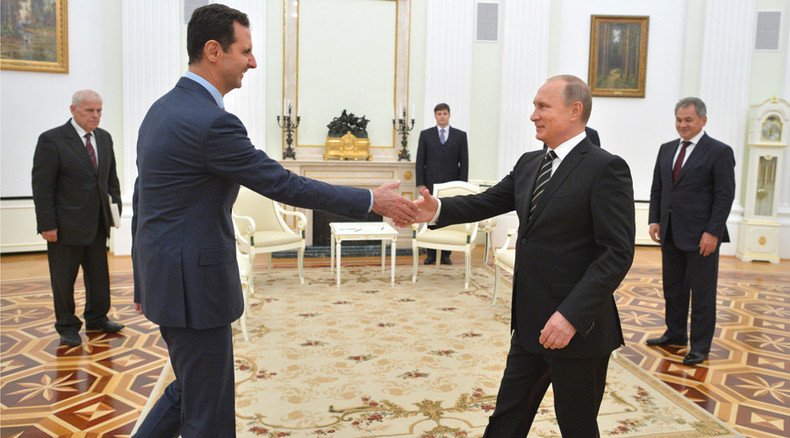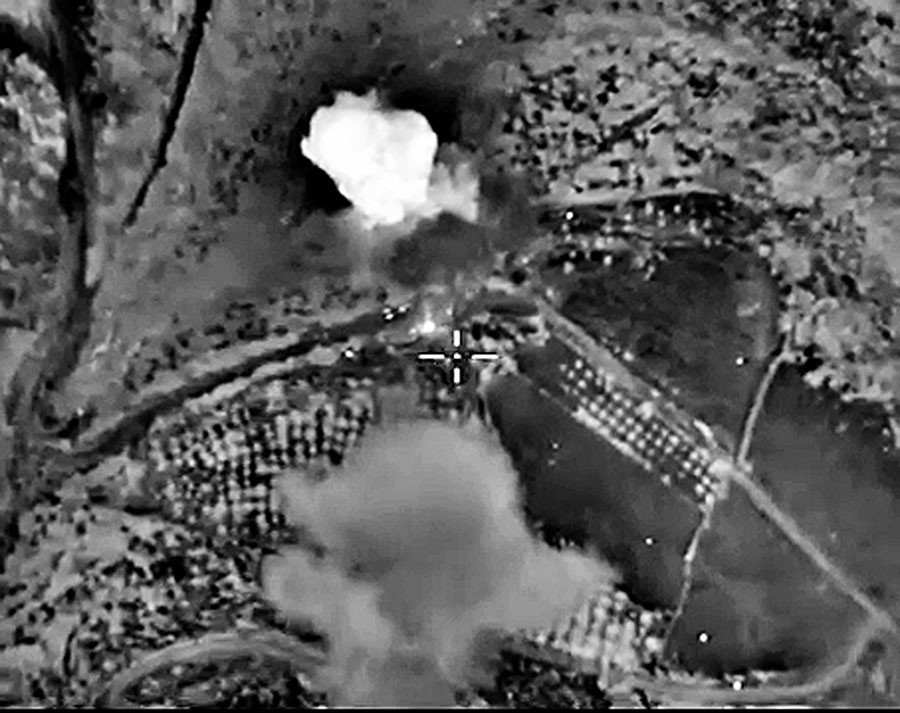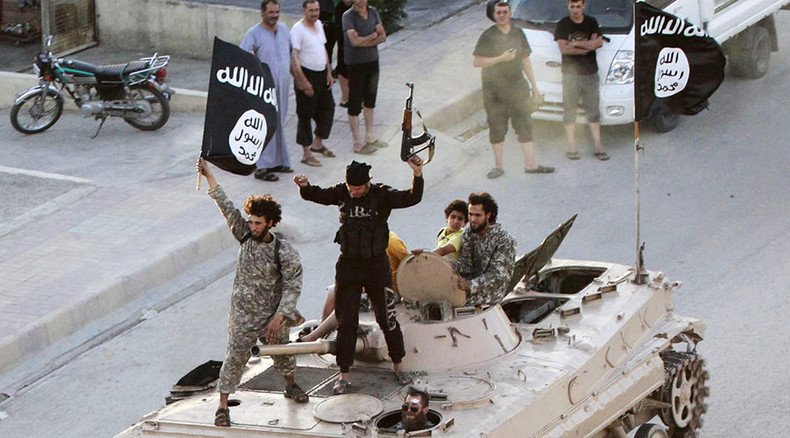'Russia gatecrashed underground NATO party in Syria'

Russia has turned on the lights on a Syrian operation that has been going on now for four years, where NATO countries have been able to operate more or less in the shadows, Patrick Henningsen geopolitical analyst from 21st Century Wire.com told RT.
Syrian President Bashar Assad met Tuesday with Russian President Vladimir Putin in Moscow. The main agenda was the fight against Islamic State and the volatile situation on the ground in Syria.
RT: A surprise visit by Assad to Moscow, how much importance can we read into it?
Patrick Henningsen: It is interesting; this is the second high-profile world leader to come to Moscow and to have diplomatic meetings with the President there in Russia. Again, we’re seeing Russia take the role of leadership on the international stage. It has seen an opening in the situation in Syria and it has moved in order to provide leadership in a situation that many people felt was dragging on and on with no real conclusive results.
We know now the reason for that – it is because there is are a lot of clandestine activity that has been going on, not just in Syria but in the periphery as well – in Turkey, in Jordan, in Northern Iraq as well. And because of that clandestine activity the US… the game plan was not to make progress in flushing out the terrorist menace that infested Syria and Northern Iraq. If it had been, we would have seen it disappear already after 22,000 bombs were dropped in the last 13 months.
RT: As you said, the US has been carrying out its campaign for already 13 months, while Russia destroyed over a hundred targets in approximately a couple of weeks. How do you think Russia made such progress in such a short amount of time? It is confusing, isn’t it?
PH: It isn’t if you look at common sense. Even in the combat theatre, and there are quite a few military experts that are constantly bending platitudes around Washington all day and every day on US media. But I said on your program back in 2012 and 2013 that if the US and the West was really serious about dealing with the terrorist threat, which had infested that country, that they would work with the Assad government, work with the government in Damascus, because that is the ground force – they have the most ground intelligence, they have the best ability to spot targets and gather intelligence and act on that.
READ MORE: Assad to Putin at Moscow talks: Terrorists would seize larger areas if Russia did not act
That is all Russia is doing – it is just going in and working with the key player that they need to work with. Because the US has already blocked itself off from any real solution by insisting that the government in Damascus go, or leave, or insist on regime change, as their stated policy directive since 2011, then there really was no chance ever that it could achieve what its stated goals are – which was to deal with the terrorist menace when it came on the scene when ISIS was announced last summer.
RT: If the US claims that it really wants to destroy ISIS, why then it doesn’t it want to unite with Russia and other countries that are willing to fight terrorism?
PH: It should be, but unfortunately the US put all its poker chips on one side of the table from the beginning… insisting on regime change in Damascus, which is basically an extension of what Washington has managed to achieve in places like Iraq, in places like Libya, regime change by force. They believe that they can do this again and it is proven to be quite a challenge. In fact, it has been a complete failure this time around.
That is not to say that the clandestine or the proxy war will not continue. This is really a proxy battle between the NATO countries and Russia, now using Syrian as the playing pitch, not unlike what we saw in Lebanon in the 1980’s- early 1990’s – where Lebanon was being used as a sort of battle pitch for some kind of a war between numerous parties, including Syria and Israel. The result was that the country was completely decimated, and it has taken 20 years to rebuild itself. I would guess that Syria will take a few decades to not just rebuild itself, but to find some kind of social cohesion.
Even still today we have CIA ex-operatives coming on CNN saying that Syria will have to be Balkanized, it will have to be partitioned, because Sunnis can’s live with Shia anymore. This is amazing considering the US has been pushing the division in that country by fueling, funding, arming guerilla warfare and terrorist groups by extension, in that country. And they are turning around now and saying the country needs to be Balkanized, It’s absolutely astonishing.
RT:There has been a recent change of rhetoric with certain Western leaders who used to say that Assad has to go. Now they are saying that maybe he can stick around for a little bit. Is there a particular reason why the rhetoric has suddenly changed?
PH: I think it changed. Russia has basically gatecrashed an underground party – if you want to use that metaphor – that has been going on now for four years – where countries like the US, like Turkey, like Jordan, like NATO countries, Britain included, France have been able to operate more or less in the shadows here in this grey area which they prefer to operate in, and Russia is just basically barged in, switched on the lights saying: “Look, who’s going to clean up this mess?” We’re in danger of losing a nation state here; we’re in danger of tremendous further loss of life; more refugees fleeing the battle zone. And Russia is coming to flick the lights on and said: “Right, the party is over! Let’s get down to ... attacks now. I’m going to work with Damascus. We’re going to deal with this.”

They are very upset in Washington, they still throw temper tantrums. Even this week they are saying: “Oh, Russia has made a horrible move.” Ash Carter saying that when Russia sustains causalities, it is not going to be so much fun anymore, and also saying things like: “This is going to be their Afghanistan all over again.” Well, this is very different from Afghanistan because Russia has been invited in by the sovereign, by the legal democratically elected internationally recognized government in Damascus...
This is like Operation Cyclone in Afghanistan – only the US is basically doing what they were doing there back in the late 1970’s – early 1980’s along the lines of the big new [Zbigniew] Brzezinski foreign policy project – nation building project. That is more or less what the US has been doing by creating another Sunni mujahedeen conglomerate or conclave, which is running amok in the region and is causing a tremendous amount of instability. Hopefully we’re seeing that cartel a bit now, and a lot of people in the international community are beginning to realize that this is a very good thing – what has been happening the last two weeks.
Robin Tilbrook, leader of English Democrats Party said: “Obviously, with Russia’s help the Syrian regime gets control back to its country, then the future is that [Bashar] Assad will continue being the president. If we wind up with a situation where full control can’t be retained, then eventually I suppose there will be some sort of peace deal which fragments the state.”
Game over? Russian intervention in Syria could be 'game ender' not game changer
Neil Clark, journalist and broadcaster said: “We talk about the Russian intervention has been a game changer. It could be a game ender. It could mean ‘game over’ for Western plans for regime change in that country.”
RT: The meeting marked Assad’s first trip outside his country since the civil war began four years ago. How significant is this meeting?
Neil Clark: I think it is significant because… President Assad hasn’t actually left his own country for four years since this terrible Western-backed proxy war started. It shows that he is confident now that he can leave the country, because in the last three weeks we’ve seen a radical change in the situation in Syria, haven’t we? We talk about the Russian intervention has been a game changer. It could be a game ender. It could mean ‘game over’ for Western plans for regime change in that country. And I think that reflects the fact that President Assad feels he’s confident to actually leave the country for the very first time in four years.

RT: But the West claims that its intentions are about not getting rid of Assad, but about the war on terror, isn’t it?
NC: Not at all, that is just a smokescreen, isn’t it? Let’s face it: the US has been bombing ISIS for over a year, and ISIS has actually extended its territory in that year. They were making a very few bombing raids; their only interest was in clipping the wings of ISIS, because their number one objective all the way through. In fact it goes back to 2006 where we’ve got WikiLeaks revealing the US ambassador talking about how they could destabilize Syria back in 2006. So it is a long term project, this bringing down the government of Syria. And this fighting ISIS has just been a smokescreen, we know that. What Putin has done now, he’s called the West’s bluff in a spectacular way, hasn’t he? Because the Russian attacks have done more damage to ISIS in two-and-a-half, three weeks than the United States did in over a year.
RT: Canada says it's taking its fighter jets out of Syria and Iraq, does this make Russia's role even more important?
NC: That is interesting, isn’t it? Of course we think Canada is pulling out. Britain, which was supposed to be joining in very soon, David Cameron has been the whole summer trying to propaganda ISIS for British air strikes on ISIS, ostensibly against ISIS, but we know that his main aim is regime change. We still haven’t had a vote in Parliament on that.
So I think what the Russian intervention has done has meant that the Western powers have had to rethink their policy – this business of supporting airstrikes on ISIS, when really the main aim was bombing the infrastructure. The US was bombing the electricity grid in Aleppo, for example. They were aimed to destroy the Syrian state infrastructure, not really tackling ISIS... We’ve got the declassified documents from a couple years ago showing that the US and its allies actually welcomed the rise of ISIS in Syria as a way of isolating “the regime.”
LISTEN MORE:
The statements, views and opinions expressed in this column are solely those of the author and do not necessarily represent those of RT.












